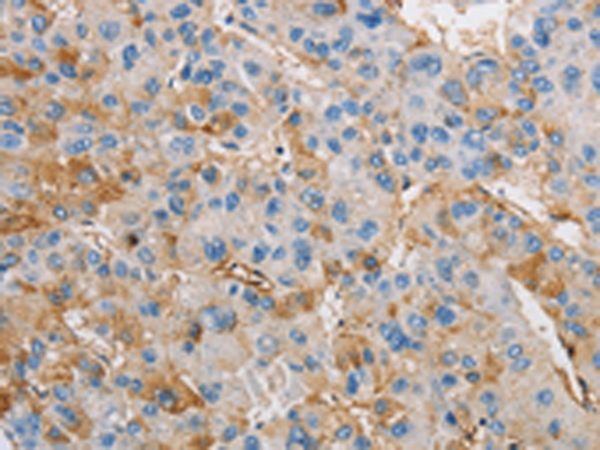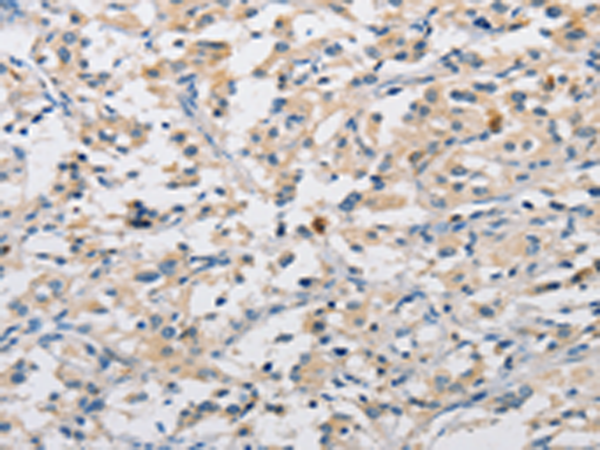

| WB | 咨询技术 | Human,Mouse,Rat |
| IF | 咨询技术 | Human,Mouse,Rat |
| IHC | 1/15-1/50 | Human,Mouse,Rat |
| ICC | 技术咨询 | Human,Mouse,Rat |
| FCM | 咨询技术 | Human,Mouse,Rat |
| Elisa | 1/1000-1/2000 | Human,Mouse,Rat |
| Aliases | ARHI; NOEY2 |
| Host/Isotype | Rabbit IgG |
| Antibody Type | Primary antibody |
| Storage | Store at 4°C short term. Aliquot and store at -20°C long term. Avoid freeze/thaw cycles. |
| Species Reactivity | Human |
| Immunogen | Fusion protein of human DIRAS3 |
| Formulation | Purified antibody in PBS with 0.05% sodium azide and 50% glycerol. |
+ +
以下是关于DIRAS3抗体的3篇代表性文献的简要信息:
1. **文献名称**:*"DIRAS3 (ARHI) inhibits tumor angiogenesis and growth by directly targeting integrin αvβ3"*
**作者**:Lu et al.
**摘要**:研究利用特异性DIRAS3抗体验证了DIRAS3蛋白通过结合整合素αvβ3抑制血管生成,在卵巢癌模型中显示其抗肿瘤活性,抗体用于检测DIRAS3在肿瘤组织中的表达水平。
2. **文献名称**:*"Development of a monoclonal antibody against DIRAS3 and its application in triple-negative breast cancer prognosis analysis"*
**作者**:Zhang et al.
**摘要**:报道了一种高特异性抗DIRAS3单克隆抗体的开发,通过免疫组化证实DIRAS3在三阴性乳腺癌中低表达,且与患者预后不良相关,抗体被用于临床样本检测。
3. **文献名称**:*"DIRAS3 regulates autophagy and apoptosis via the mTOR pathway in pancreatic cancer cells"*
**作者**:Wang et al.
**摘要**:使用DIRAS3抗体进行Western blot和免疫荧光实验,揭示DIRAS3通过抑制mTOR信号通路诱导自噬和凋亡,为胰腺癌治疗提供潜在靶点。
注:以上文献信息为示例性质,实际文献需通过学术数据库(如PubMed)检索确认。
DIRAS3. also known as ARHI or NOEY2. is a maternally imprinted tumor suppressor gene belonging to the RAS GTPase superfamily. Unlike most RAS family members that promote tumor growth, DIRAS3 acts as a negative regulator of cell proliferation, survival, and metastasis. It is expressed in normal ovarian, breast, and thyroid tissues but frequently downregulated or silenced in cancers through mechanisms like promoter methylation, loss of heterozygosity, or transcriptional repression. DIRAS3 modulates key pathways including PI3K/AKT/mTOR, STAT3. and autophagy, making it a critical player in cancer biology and potential therapeutic target.
DIRAS3 antibodies are essential tools for studying its expression patterns, epigenetic regulation, and functional roles in tumorigenesis. These antibodies enable detection of endogenous DIRAS3 protein via techniques like Western blotting, immunohistochemistry (IHC), and immunofluorescence (IF). Researchers use them to investigate DIRAS3's tumor-suppressive effects in preclinical models and evaluate its clinical relevance through correlation studies with patient survival, drug resistance, or metastasis. Some antibodies specifically recognize unique epitopes within the N-terminal extension that distinguishes DIRAS3 from other RAS proteins. Validation parameters include reactivity with DIRAS3-overexpressing cell lines and loss of signal in DIRAS3-knockdown models. Commercial DIRAS3 antibodies are typically developed in rabbit or mouse hosts, available as monoclonal or polyclonal formats, with applications spanning basic research to diagnostic biomarker development.
×